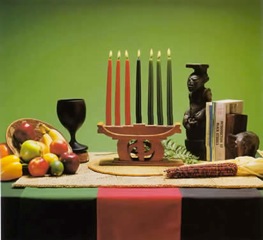This time of year, religion almost seems to corner the market on celebrations of peace and unity, but Kwanzaa offers the opportunity to attune the spirit through a cultural holiday. Many think of Kwanzaa as entirely motivated by a particular religion, but it’s a modern concept honoring seven traditional principles of the Swahili-speaking regions of Africa, and it can include the practice of spirituality of any stripe. It begins on Dec. 26 and lasts seven days, each day in honor of a different principle — umoja (unity), kujichagulia (self-determination), ujima (collective work and responsibility), ujamaa (cooperative economics), nia (purpose), kuumba (creativity) and imani (faith).
One local celebration of the holiday will be held at Unity of the Blue Ridge. At the community event, children will be lighting the candles of the kinara, each of which represents a principle of the week and will be accompanied by a spoken meditation on the corresponding principle. The event will also feature dancing to the drumbeats of The Wild Bodema, music by Richard Shulman and songs by Olympia and Jenna Jaffe.
While it’s motivated by African culture, says festivity organizer Rev. DeBorah Shelton Ogiste, anyone would enjoy the celebration regardless of their race, heritage, religion, gender or sexual preference because of the value it places on unity. “All people can live by these principles,” she says, “and if we concentrate on these principles, and these principles be our focus in life, and we can come together on that understanding — it does not matter who or what you are.”
What: Kwanzaa celebration
When: Tuesday, Dec. 26, 7 p.m.
Where: Unity of the Blue Ridge, 2041 Old Fanning Bridge Road, Mills River




As a public service, then, The Daily Caller is once again here to tell you the true — and truly bizarre — history of the violent, deranged and radical black nationalist who concocted the completely artificial holiday of Kwanzaa in 1966.
The creator of Kwanzaa is Maulana Ndabezitha Karenga, a 75-year-old professor of Africana studies at California State University, Long Beach. His real name is Ronald Everett. He was born in rural Maryland, the fourteenth child of a sharecropping Baptist minister.
Karenga was convicted in 1971 for brutally torturing two naked women. The women were members of Karenga’s ultra-radical, paramilitary, black nationalist cult called the US Organization, which went by the acronym US, according to a May 1971 Los Angeles Times story.
“Deborah Jones, who once was given the Swahili title of an African queen, said she and Gail Davis were whipped with an electrical cord and beaten with a karate baton after being ordered to remove their clothes,” the LA Times article reports.